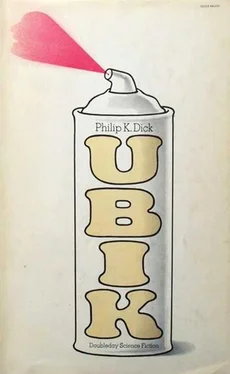Al said, “So he knows about Wendy. Well, maybe that means it won’t happen again, to the rest of us.”
“A random carton of cigarettes,” Joe said, “at a random store in a city picked at random. And we find a note directed at us from Glen Runciter. What do the other cartons have in them? The same note?” He lifted down a carton of L&Ms, shook it, then opened it. Ten packs of cigarettes plus ten more below them; absolutely normal. Or is it? Al asked himself. He lifted out one of the packs. “You can see they’re okay,” Joe said; he pulled out a carton from the middle of the stacks. “This one is full too.” He did not open it; instead, he reached for another. And then another. All had packs of cigarettes in them.
And all crumbled into fragments between Al’s fingers.
“I wonder how he knew we’d come here,” Al said. “And how he knew we’d try that one particular carton.” It made no sense. And yet, here, too, the pair of opposing forces were at work. Decay versus Runciter, Al said to himself. Throughout the world. Perhaps throughout the universe. Maybe the sun will go out, Al conjectured, and Glen Runciter will place a substitute sun in its place. If he can.
Yes, he thought; that’s the question. How much can Runciter do?
Put another way—how far can the process of decay go?
“Let’s try something else,” Al said; he walked along the aisle, past cans, packages and boxes, coming at last to the appliance center of the store. There, on impulse, he picked up an expensive German-made tape recorder. “This looks all right,” he said to Joe, who had followed him. He picked up a second one, still in its container. “Let’s buy this and take it back to New York with us.”
“Don’t you want to open it?” Joe said. “And try it out before you buy it?”
“I think I already know what we’ll find,” Al said. “And it’s something we can’t test out here.” He carried the tape recorder toward the checkstand.
Back in New York, at Runciter Associates , they turned the tape recorder over to the firm’s shop.
Fifteen minutes later the shop foreman, having taken apart the mechanism, made his report. “All the moving parts in the tape-transport stage are worn. The rubber drive-tire has flat spots on it; pieces of rubber are all over the insides. The brakes for high-speed wind and rewind are virtually gone. It needs cleaning and lubricating throughout; it’s seen plenty of use—in fact, I would say it needs a complete overhaul, including new belts.”
Al said, “Several years of use?”
“Possibly. How long you had it?”
“I bought it today,” Al said.
“That isn’t possible,” the shop foreman said. “Or if you did they sold you—”
“I know what they sold me,” Al said. “I knew when I got it, before I opened the carton.” To Joe he said, “A brand-new tape recorder, completely worn out. Bought with funny money that the store is willing to accept. Worthless money, worthless article purchased; it has a sort of logic to it.”
“This is not my day,” the shop foreman said. “This morning when I got up my parrot was dead.”
“Dead of what?” Joe asked.
“I don’t know, just dead. Stiff as a board.” The shop foreman waggled a bony finger at Al. “I’ll tell you something you don’t know about your tape recorder. It isn’t just worn out; it’s forty years obsolete. They don’t use rubber drive-tires any more, or belt-run transports. You’ll never get parts for it unless somebody handmakes them. And it wouldn’t be worth it; the damn thing is antiquated. Junk it. Forget about it.”
“You’re right,” Al said. “I didn’t know.” He accompanied Joe out of the shop and into the corridor. “Now we’re talking about something other than decay; this is a different matter. And we’re going to have trouble finding edible food, anywhere, of any kind. How much of the food sold in supermarkets would be good after that many years?”
“The canned goods,” Joe said. “And I saw a lot of canned goods at that supermarket in Baltimore.”
“And now we know why,” Al said. “Forty years ago supermarkets sold a far greater proportion of their commodities in cans, rather than frozen. That may turn out to be our sole source; you’re right.” He cogitated. “But in one day it’s jumped from two years to forty years; by this time tomorrow it may be a hundred years. And no food is edible a hundred years after it’s packaged, cans or otherwise.”
“Chinese eggs,” Joe said. “Thousand-year-old eggs that they bury in the ground.”
“And it’s not just us,” Al said. “That old woman in Baltimore; it’s affecting what she bought too: her azalea.” Is the whole world going to starve because of a bomb blast on Luna? he asked himself. Why is everyone involved instead of just us?
Joe said, “Here comes—”
“Be quiet a second,” Al said. “I have to think something out, Maybe Baltimore is only there when one of us goes there. And the Lucky People Supermarket; as soon as we left, it passed out of existence. It could still be that only we who were on Luna are really experiencing this.”
“A philosophical problem of no importance or meaning,” Joe said. “And incapable of being proved one way or the other.”
Al said caustically, “It would be important to that old lady in the blueberry-colored cloth coat. And to all the rest of them.”
“Here’s the shop foreman,” Joe said.
“I’ve just been looking at the instruction manual,” the shop foreman said, “that came with your tape recorder.” He held the booklet out to Al, a complicated expression on his face. “Take a look.” All at once he grabbed it back. “I’ll save you the trouble of reading; look here on the last page, where it tells who made the damn thing and where to send it for factory repairs.”
“ ‘Made by Runciter of Zurich,’ ” Al read aloud. “And a maintenance station in the North American Confederation—in Des Moines. The same as on the matchfolder.” He passed the booklet to Joe and said, “We’re going to Des Moines. This booklet is the first manifestation that links the two locations.” I wonder why Des Moines, he said to himself. “Can you recall,” he said to Joe, “any connection that Runciter ever had, during his lifetime, with Des Moines?”
Joe said, “Runciter was born there. He spent his first fifteen years there. Every once in a while he used to mention it.”
“So now, after his death, he’s gone back there. In some manner or other.” Runciter is in Zurich, he thought, and also in Des Moines. In Zurich he has measurable brain metabolism; his physical, half-life body is suspended in cold-pac in the Beloved Brethren Moratorium , and yet he can’t be reached. In Des Moines he has no physical existence and yet, evidently, there contact can be established—in fact, by such extensions as this instruction booklet, has been established, at least in one direction, from him to us. And meanwhile, he thought, our world declines, turns back onto itself, bringing to the surface past phases of reality. By the end of the week we may wake up and find ancient clanging streetcars moving down Fifth Avenue. Trolley Dodgers , he thought, and wondered what that meant. An abandoned verbal term, rising from the past; a hazy, distant emanation, in his mind, canceling out current reality. Even this indistinct perception, still only subjective, made him uneasy; it had already become too real, an entity which he had never known about before this moment. “Trolley Dodgers,” he said aloud. A hundred years ago at least. Obsessively, the term remained lodged within awareness; he could not forget it.
“How come you know that?” the shop foreman asked.
Читать дальше








